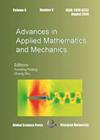深度域分解方法:亥姆霍兹方程
IF 1.1
4区 工程技术
Q2 MATHEMATICS, APPLIED
引用次数: 1
摘要
. 提出了一种基于深度学习的Helmholtz方程Robin-Robin域分解方法(DeepDDM)。我们首先提出了基于平面波激活的神经网络(PWNN),它比有限差分方法(FDM)更有效地求解常系数和波数k的亥姆霍兹方程。在此基础上,我们使用PWNN对由领域分解方法(DDM)划分的子问题进行离散化,这是DeepDDM的主要思想。本文将研究使用DeepDDM求解连续和不连续亥姆霍兹方程的迭代次数。结果表明:在相同Robin参数下,DeepDDM表现出与传统基于fdm的鲁棒域分解方法(FDM-DDM)一致的行为,即DeepDDM的迭代次数与FDM-DDM的迭代次数基本相同。通过在不同子域上选择合适的Robin参数,无论在连续情况还是不连续情况下,收敛速度都随波数的增加而保持不变。DeepDDM在亥姆霍兹方程上的表现可能为通过深度学习改进PDE求解器提供新的见解。本文章由计算机程序翻译,如有差异,请以英文原文为准。
Deep Domain Decomposition Methods: Helmholtz Equation
. This paper proposes a deep-learning-based Robin-Robin domain decomposition method (DeepDDM) for Helmholtz equations. We first present the plane wave activation-based neural network (PWNN), which is more efficient for solving Helmholtz equations with constant coefficients and wavenumber k than finite difference methods (FDM). On this basis, we use PWNN to discretize the subproblems divided by domain decomposition methods (DDM), which is the main idea of DeepDDM. This paper will investigate the number of iterations of using DeepDDM for continuous and discontinuous Helmholtz equations. The results demonstrate that: DeepDDM exhibits behaviors consistent with conventional robust FDM-based domain decomposition method (FDM-DDM) under the same Robin parameters, i.e., the number of iterations by DeepDDM is almost the same as that of FDM-DDM. By choosing suitable Robin parameters on different subdomains, the convergence rate is almost constant with the rise of wavenumber in both continuous and discontinuous cases. The performance of DeepDDM on Helmholtz equations may provide new insights for improving the PDE solver by deep learning.
求助全文
通过发布文献求助,成功后即可免费获取论文全文。
去求助
来源期刊

Advances in Applied Mathematics and Mechanics
MATHEMATICS, APPLIED-MECHANICS
CiteScore
2.60
自引率
7.10%
发文量
65
审稿时长
6 months
期刊介绍:
Advances in Applied Mathematics and Mechanics (AAMM) provides a fast communication platform among researchers using mathematics as a tool for solving problems in mechanics and engineering, with particular emphasis in the integration of theory and applications. To cover as wide audiences as possible, abstract or axiomatic mathematics is not encouraged. Innovative numerical analysis, numerical methods, and interdisciplinary applications are particularly welcome.
 求助内容:
求助内容: 应助结果提醒方式:
应助结果提醒方式:


